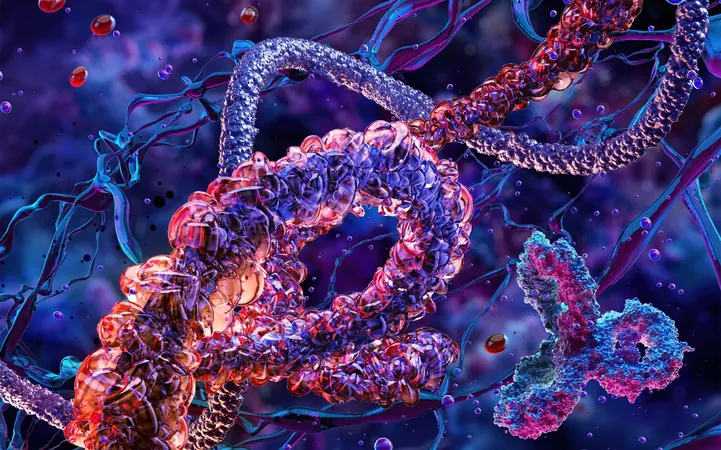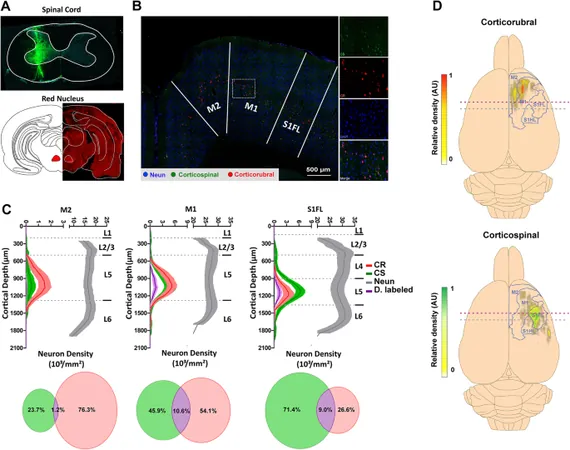
The Astonishing Breakthrough: How Water Sparked the Birth of Earth's First Proteins
2025-08-31
Author: Amelia
Unlocking the Secrets of Life's Building Blocks
Life as we know it depends on proteins for vital functions, from repairing cells to defending against diseases. Scientists have long pondered the origins of these essential molecules, particularly how the very first proteins formed in the absence of advanced cellular machinery.
A Revolutionary Process Revealed
A groundbreaking study led by Professor Matthew Powner from University College London (UCL) uncovers a simple yet water-friendly reaction that could mark the first steps towards protein synthesis. The research focuses on the enigmatic relationship between nucleic acids and proteins, which remains shrouded in mystery.
The Role of RNA and Amino Acids
The UCL team demonstrated that RNA, a molecule crucial for storing and transferring genetic information and catalyzing reactions, can chemically bond with amino acids—the building blocks of proteins. Remarkably, this linkage can occur without enzymes and requires only mild conditions in water.
Harnessing Energy for Chemistry
By transforming amino acids into more reactive forms that retain additional energy, the researchers managed to link these energized amino acids to RNA effectively, achieving an impressive yield of up to 76% for some amino acid combinations.
The Power of Sulfur Chemistry
The study points to the role of thioesters, sulfur-containing compounds that play a key role in metabolism, which could have been present on early Earth. Unlike many other compounds, thioesters can participate in reactions in water without rapidly degrading, making them ideal for fostering protein-related chemistry.
A Synergistic Approach to Protein Formation
The research revealed a fascinating dual-step mechanism: thioesters first facilitate the attachment of amino acids to RNA, leading to the creation of aminoacyl RNA, and then convert into thioacids to promote peptide bond formation, yielding peptidyl RNA—crucial precursors to protein function.
The Birthplace of Proteins: Neutral Waters
This remarkable chemistry unfolds in water at neutral pH, suggesting that life's origins may have been in smaller bodies of water, such as ponds or wet shorelines, rather than the vast ocean. The study highlights how freezing cycles in these environments could enhance chemical reactions.
Connecting Chemistry with Biology
Modern cells utilize ribosomes to construct proteins by linking amino acids based on messenger RNA instructions. This new chemistry could offer insight into how early RNA managed amino acids independently, potentially solving the age-old chicken-or-egg problem.
Pathway to the Genetic Code
As the research indicates, this process could lead to a foundational understanding of how RNA might've evolved to formulate peptide sequences, paving the way for the development of the ribosome and the sophisticated genetic code we observe today.
Conclusion: A Glimpse into Our Origins
This pioneering study provides a plausible window into the origins of life on Earth, highlighting how essential biochemical processes could have emerged in a primordial, water-rich environment. The findings not only point towards a greater understanding of life's beginnings but also open doors to future research in prebiotic chemistry.
The research was published in the journal Nature, marking a significant leap in our understanding of life's earliest building blocks.









 Brasil (PT)
Brasil (PT)
 Canada (EN)
Canada (EN)
 Chile (ES)
Chile (ES)
 Česko (CS)
Česko (CS)
 대한민국 (KO)
대한민국 (KO)
 España (ES)
España (ES)
 France (FR)
France (FR)
 Hong Kong (EN)
Hong Kong (EN)
 Italia (IT)
Italia (IT)
 日本 (JA)
日本 (JA)
 Magyarország (HU)
Magyarország (HU)
 Norge (NO)
Norge (NO)
 Polska (PL)
Polska (PL)
 Schweiz (DE)
Schweiz (DE)
 Singapore (EN)
Singapore (EN)
 Sverige (SV)
Sverige (SV)
 Suomi (FI)
Suomi (FI)
 Türkiye (TR)
Türkiye (TR)
 الإمارات العربية المتحدة (AR)
الإمارات العربية المتحدة (AR)